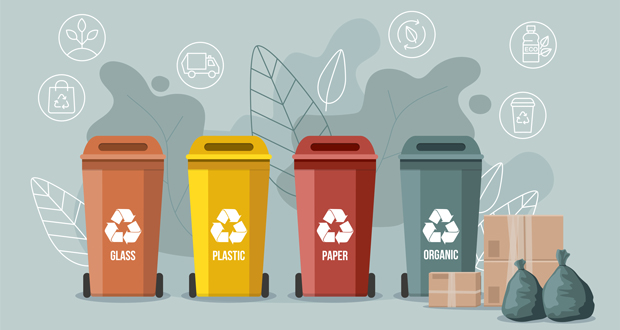Nearly one fifth (17 per cent) of England and Wales’ waste (from both businesses and households) cannot be recycled due to contamination, according to new research by waste management firm Biffa.
The experts analysed the latest available WRAP waste collection data between 2016 and 2020 to determine the contamination rate, based on the amounts of non-target and non-recyclable materials that entered UK material recycling facilities (MRFs).
After a recent WRAP survey revealed that over four in five people recycle items they shouldn’t, Biffa’s examination of the waste itself shows the amount of ‘wishcycling’ (assuming an item is recycling) that happens.
Biffa’s analysis found that, in 2016, the average contamination rate of recycling waste was 13.4 per cent, rising over four years to 17 per cent by the end of 2020 – more than three per cent in as many years.
The data also showed that non-recyclable materials played a bigger part in contaminating recycling. In 2020, non-target materials (recyclable items that have been placed in the wrong bin) accounted for 6.5 per cent of contaminated waste. Meanwhile, non-recyclables (items that either cannot be recycled or are too contaminated with other materials, such as food) made up 10.4 per cent of contaminates.
David Heaton, Business Director of MRFs and PRFs at Biffa, said this of the findings: “Contamination happens when items are disposed of in the wrong bins or haven’t been rinsed before being recycled. It means recyclable resources are lost and cannot be reused. It’s important that people understand what should go in the recycling bin and how to ‘pre-cycle’ beforehand (to rinse a tub or tray if it’s got food on it, for example) so we can recycle as much material as possible. Business leaders can play a crucial role here – educating their workforce through signage and engaging waste experts will drive a positive change, while helping them hit their sustainability targets.
“Should the alarming trajectory we’re seeing continue, contamination rates could reach nearly one quarter of all recycling by 2030 without legislative intervention. EPR (Extended Producer Responsibility – making producers responsible for the cost of managing packaging waste) – and consistent kerbside collections are actions planned by the Government to be introduced from 2024. However, without these changes in legislation, recycling and contamination rates are unlikely to improve. All being well though, we could see a step up from businesses and consumers.
“It’s vital as a nation that we get better at effective ‘pre-cycling’ – sorting waste correctly before collection – to reduce contamination rates. Recycling does not happen by magic, but we’re proudly working closely with businesses to understand and improve behaviours to enable more sustainable operations.”
Biffa has produced guides for consumers and businesses to promote better recycling: The seven different types of plastic and Recycling symbols explained.
According to Pitney Bowes Parcel Shipping Index, worldwide parcel volume is likely to double in the next five years, with the UK showing the highest increase in carrier revenue of all 13 countries in the Index.
Alongside a huge uptake in the volume of parcel volume and spend, post pandemic, the adoption of hybrid working patterns means that FMs need to find ways to enable staff to book / host collaborative meetings in available workspaces and to find desk, office and parking spaces by utilising automation and data capture to enable site governance.
Yet a recent survey by FMJ in partnership with Pitney Bowes found that 20 per cent of recipients are still using manual paper-based visitor systems, which doesn’t fit with their top priority – to maintain a safe and operational environment.
This overwhelming reliance on paper-based systems is causing many respondents bottlenecks, resulting in a lack of efficiently in logging and tracking packages and people coming into the organisation.
In this webinar, Gary Abbott Director of Business Development and Stuart Bushaway, Head of Dealers Operations and FM Relationships at Pitney Bowes will outline the main findings of the two surveys and what this could mean for FMs, followed by a discussion, chaired by FMJ Editor Sara Bean with a panel of thought leaders into the solutions available to meet these challenges.
Register for the webinar here.





